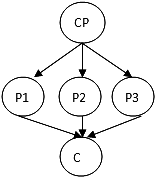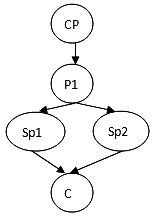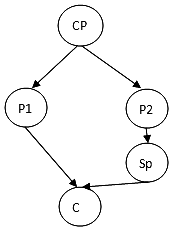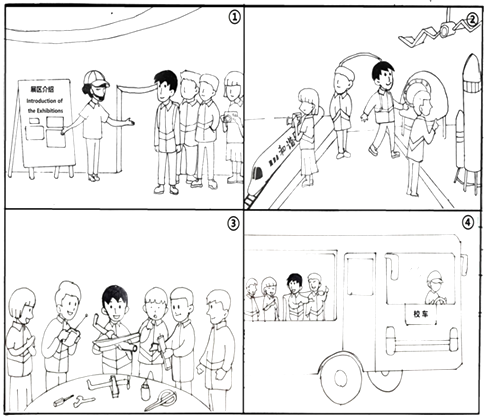—Yes, that's _____I try my best to learn English well.
—Boy, you ________. Our neighbor has offered to help us.
—It's a pity. How I wish I ________ time to attend it.
Flowers for Miss Benson
Miss Benson was the kindest, sweetest, most beautiful person on the earth in my mind. She was my second-grade 1 Early in the term, I started asking my mother to put an extra apple in my lunch for Miss Benson.2I never quite worked up the courage to hand my gift to her3. Each day it found its way unobserved to the corner of her desk. And each day the response was the same:
Miss Benson would come in and sit down. “Good morning, children. Why, how nice!” She would pick up the4 of the day, and then look around the room. “What 5little boy or girl brought me this?”
No one6the honor, least of all me. I kept my head down, looking at my desk.
“Can it be that I have a secret admirer?” she would ask.
I would feel the7rising in my face. I was certain that everyone was looking at me, and I would sigh with 8 when Miss Benson started the lesson after putting the fruit away.
One fall morning, the class was boiling with 9. As was said, the next day, Friday, was Miss Benson's birthday. Everyone wanted to get her a present. My heart gave a jump; at last I could give her something 10. That afternoon was spent combing the fields for wild flowers.
In the morning I hung back as others 11their gifts. Finally I went to the desk and gave the flowers to Miss Benson. My reward was a smile and a pat on the head.
The next Monday, Miss Benson didn't 12. Later on, I was asked to go to the principal's office. He, clearly and slowly, told me that because of the poison 13I gave her, Miss Benson was in hospital.
I 14 all the way home because of the tragedy to my loving teacher. I begged my mother to take me to visit Miss Benson.
Miss Benson was sitting up in bed when we arrived. Her15was covered with bandages. Only one eye was showing.
“I didn't know they were poison flowers,” I burst out. “I didn't 16to make you sick. I only wanted to give you something.....” I stopped talking and swallowed hard.
Miss Benson 17me with the eye. “You wanted to give me something 18 didn't you, Paul?”
I nodded.
“All those 19 were from you, weren't they?”
Again I nodded.
“I'll tell you a great big secret, Paul,” she continued, “When I am married, if I have a son, I would like him to grow up just 20you.”
I wasn't certain that I saw tears in her eye as Mother led me out of the room.
Teary-Eyed Stories from Strangers
The Man at the Market
When the supermarket clerk summed up my groceries, it was $12 over what I had on me. I began to remove items from the bags, when another shopper handed me a $20 bill. “Please don't put yourself out,” I told him.
“Let me tell you a story,” he said. “My mother is in hospital with cancer. I visit her every day and bring her flowers. I went this morning, and she got mad at me for spending my money on more flowers. She demanded that I do something else with that money. So, here, please accept this. It is my mother's flowers.”
A Family's Food Angel
Since my mother lost her job, our family troubled new worries: no income, the same bills, and no way to afford groceries. It was around this time that she started finding boxes of food outside our door every morning. This went on for months, until she was able to land a job. We never did find out who it was and who left the groceries for us, but they truly saved our lives.
Seven Miles For Me
Leaving a store, I returned to my car only to find that I'd locked my keys and cell phone inside. A teenager riding his bike saw me kick a tire and say a few choice words. “What's wrong?” he asked.
I explained my situation. “But even if I could call my wife,” I said, “she can't bring me her car key, since this is our only car.” He handed me his cell phone. “Call your wife and tell her I'm coming to get her key.”
“That's seven miles round trip.”
“Don't worry about it.”
An hour later, he returned with the key. I offered him some money, but he refused. “Let's just say I needed the exercise,” he said. Then, like a cowboy in the movies, he rode off into the sunset.
Breaking Bread
Last December, before work, I stopped at a deli (熟食店) and ordered an everything bagel with cream cheese. It was toasty warm, and I couldn't wait to dig in. But as I left the store, I noticed an older indigent gentleman sitting at the bus stop. Knowing it would probably be his only warm meal of the day, I gave him the bagel.
But all was not lost for me. Another customer from the deli offered me half of her bagel. I was so delighted because I realized that in one way or another, we are all looked after.
Fitbit Charge

A special cut-off, just $39.99!
Come and get one!
Energize your day with Charge—an advanced activity wristband that tracks your steps taken, distance traveled, calories burned, floors climbed and active minutes. Stay connected throughout the day with real-time fitness statistics and Caller ID on the OLED display. And when the day is done, it automatically monitors your sleep and sets a silent, shaking alarm. Whether you're at the office or on the go, Charge wirelessly syncs (同步) your statistics to your smartphone and computer to help you find the motivation you need to achieve your goals.
DETAILED INFORMATION
Size: Small fits 5.5"--6.5", Large fits 6.5"--7.7". Refer to this sizing guide to be sure you get the right fit.
Activity Tracking -- Accurately track all-day statistics like steps taken, distance traveled, calories burned, stairs climbed, and active minutes.
See daily statistics, time of day, and exercise mode with a bright OLED display.
Auto Sleep + Silent Alarm — Monitor your sleep automatically and wake with a silent alarm.
Caller ID — Get call notice right on your wrist when your smartphone is nearby.
Access real-time run statistics like time, distance, and pace to stay on track.
Sync statistics wirelessly and automatically to your computer and over 150 leading smartphones.
See compatible (兼容的) iOS, Android, and Windows phones.
FREQUENTLY ASKED QUESTIONS
How do I reset my tracker?
If your tracker is not responding, it may be fixed by restarting.
1 Plug your charging cable into the USB port and insert your tracker into the charging cable.
2 Insert a paperclip into the small pinhole on the back of the charger.
3 Press on the pinhole for 3—4 seconds.
Your tracker will now be reset. Take your tracker out of the charger and insert it back into the wristband.
How do I charge my tracker?
Your tracker battery lasts for about 5 days. To charge it, remove the tracker from the band and place it in the charger until all 5 lights are solid.
If you have more questions, you may log in and post your questions here. We will solve your problems as soon as possible.
Optimism May Help People Live Longer
People who have an optimistic view on life are more likely to live longer, a US study said Wednesday.
The study, published in the American Journal of Epidemiology, analyzed data from 2004 to 2012 from 70,000 women enrolled in the Nurses' Health Study, a long-running US study tracking women's health via surveys every two years.
The researchers looked at participants' levels of optimism and other factors that might play a role in how optimism may affect mortality risk, such as race, high blood pressure, diet, and physical activity.
It found the most optimistic women, or the top 25%, had a nearly 30 percent lower risk of dying from any of the diseases analyzed in the study compared with the least optimistic women, or the bottom 25%.
The most optimistic women had a 16 percent lower risk of dying from cancer; 38 percent lower risk of dying from heart disease; 39 percent lower risk of dying from stroke; 38 percent lower risk of dying from respiratory disease; and 52 percent lower risk of dying from infection.
Previous studies have linked optimism with reduced risk of early death from cardiovascular (心脑血管的) problems, but this was the first to find a link between optimism and reduced risk from other major causes.
“While most medical and public health efforts today focus on reducing risk factors for diseases, evidence has been mounting that enhancing psychological resilience (弹性,复原力) may also make a difference,” said Eric Kim, research fellow at the Harvard T.H. Chan School of Public Health and co-lead author of the study.
“Our new findings suggest that we should make efforts to boost optimism, which has been shown to be associated with healthier behaviors and healthier ways of coping with life challenges.”
The study also found that healthy behaviors only partially explain the link between optimism and reduced mortality risk. One other possibility is that higher optimism directly affects our biological systems, Kim said.
Co-lead author and postdoctoral research fellow Kaitlin Hagan said optimism can be varied with relatively uncomplicated and low-cost interventions (干预), even things as simple as having people write down and think about the best possible outcomes for various areas of their lives, such as careers or friendships.
“Encouraging use of these interventions could be an innovative way to enhance health in the future,” Hagan said.
Hobbies Help Cure Addiction to the Internet
While some parents have expressed concerns about the amount of time their children spent surfing the Internet during the summer break from school, it wasn't a problem for Yin Qiming.
Instead, the 37-year-old Shanghai resident and his daughter divided their vacation between cyberspace and the 8-year-old's other interests.
“My daughter has many hobbies and I and her mother respect her choices, so we accompany her to classes she enjoys, such as learning to play the drums and drawing,” he said.
“She loves to play outside with her friends, so she doesn't think the Internet is a must-have thing in her life.”
Yin added that he rarely imposes a time limit on his daughter's online activity.
“She sometimes uses WeChat (a popular instant-messaging tool) on my mobile phone, but only to contact her mother,” he said. “Once she has her own plans every day and realizes that the internet is just a part of life, she won't become addicted to it.”
Li Lin, a primary school teacher from Liaoning province, expressed a similar opinion.
“We do some homework online, including reciting stories, and the children use the Internet frequently every day of their lives,” she said, noting that the children's online activity is limited to 30 minutes a day at school.
“We should make better use of the Internet to provide children with more knowledge and help them to grow up,” said Li, who has a 10-year-old son.
The key to preventing children, especially those at primary and middle schools, from becoming addicted to the Internet is to limit the time they spend online and to ensure that they know cyberspace cannot replace traditional forms of communication, she said.
Mao Feizhu, a psychologist from Fujian province in southeast China, said people overestimate the influence of the internet.
“Many people, even some parents, believe the Internet plays a big role in our daily lives, and many things can be completed online, but that's not completely right,” she said.
“We can use social applications to talk or play basketball games, and even share what we are thinking about, but sometimes it's impossible for our emotions to be accurately reflected in this way. What children need is emotional communication and real physical exercise. After all, love cannot be bought on the net,” she said.
Perhaps, the best way to stop young netizens spending too much time online is to encourage their other interests but also accompany them when they go online: “We should use the Internet, not become its slaves.
I: Introduction CP: Central point P: Point Sp: Sub-point C: Conclusion
 B .
B .  C .
C .  D .
D . 
Think Positive and Feel Positive
When you're in a stressful situation, are you confident or unsafe? Do you react positively or negatively?
A study by researchers at the University of Notre Dame found that negative thinking, and depression coming from it, can be catching in certain circumstances.
For example, the researchers studied 103 freshman college roommates who'd been paired casually.Specifically, the researchers measured the subject's likelihood to see negative events as a reflection of their abilities and disadvantages.
After only six months, it became clear that thinking patterns and styles can be catching.And students paired with more positive thinking roommates were more likely to become more positive in their thinking and report less depression.
So they might be particularly accessible to adopting the thought and behavior patterns of people around them — perhaps more so than people in less intense situations at other stages of life.
But maybe not. Other research has shown that, in general, people are affected by how those around them think.
A. The answer may depend in part on whom you're around.
B. Now college freshman are in a unique, life changing environment.
C. However, think positive and feel positive is quite important for college students.
D. Students paired with a negative-thinking roommate “caught” that style and became more depressed themselves.
E. They measured each roommate's cognitive weakness, or tendency to give in to negative thinking and depression.
F. So surrounding a negative, depressed person with people who think positively could be a powerful form of treatment.
G. But what was to the researchers' embarrassment was that the subjects never talked with each and stayed apart from each other for most of the time.
⑴景点名称;
⑵参观内容;
⑶推荐理由。
注意:
⑴词数不少于50;
⑵开头和结尾已给出,不计入总词数。
Dear Jim,
Yours,
Li Hua
注意:词数不少于60。
提示词:China Science and Technology Museum中国科技馆
